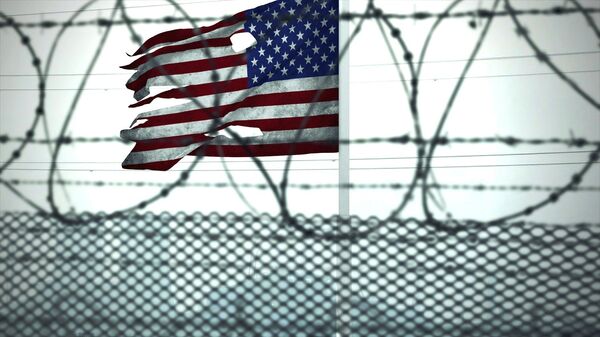“All of these jails are concentration camps, and coronavirus, which is spreading in Rikers, makes it a death camp,” former Black Panther Party member and rights advocate Eddie Conway said. “They [prison officials] need to do something so people can protect themselves. There’s gonna be a humanitarian disaster of genocidal proportions. There are 2.3 million people in prison in the United State, 75 percent of them people of color.”
Conway, who spent 44 years behind bars for committing a murder he has always denied, warned that the coronavirus “is rocking the US” and “expanding exponentially.” He said the states must act now to address the crisis.
“They need to give them hand sanitizers. Officials declare it as contraband, but it should be available in certain allotments, even one little medicine cup after a meal,” said Conway, an author and host of The Real News Networks’ Rattling the Bars.
Conway said prison and jail guards are constantly coming back into the community when they leave work each day, thus jeopardizing those in the community with whom they come in contact.
“This is what I think needs to happen: they need to let out at-risk people, give hazardous pay to cooks, those who mop floors, clean up and pick up trash. They should get hazardous pay for being forced to be exposed,” Conway said. “What people are asking for but it’s not listened to here is the release of Everest prisoners – those who’re old and sick. They could wear ankle monitors.”
The state of New York has become the epicenter of the coronavirus epidemic in the United States, with more than 31,880 confirmed cases and 192 deaths.
Legal groups in New York City and across the country have been pushing for government officials to protect those behind bars from the proliferation of the coronavirus, and are urging prison and jail officials to devise plans and strategies to reduce the risk to all incarcerated individuals, especially the most vulnerable.
New York City Mayor Bill de Blasio on March 25 said that city officials are identifying people most vulnerable to COVID-19 because of poor health or health problems or who were arrested for minor crimes, and will release them.
Legal Aid Society Deputy Communications Director, Redman Haskins, believes authorities are being “cagey” and low-balling the numbers, specifically at Rikers where he thinks the number of COVID-19 positive cases is closer to 60.
Haskins said those in corrections running prisons and jails in New York and elsewhere have a dismal track record when it comes to providing anything close to quality healthcare.
“Jails have never been known for the administration of healthcare,” Haskins said. “A lot of people are not in the best of health, and corrections has a longstanding history of not providing adequate healthcare. If they don’t do it in normal times, what about now?”
On Wednesday, New York corrections officials announced that at least 75 people tested positive for coronavirus including 54 at Rikers Island prison complex alone, although media and rights groups reported the numbers could be over 80. Earlier, the state of Connecticut announced a COVID-19 case while more than a dozen other states have begun releasing non-violent offenders across the United States amid the virus crisis.
Across the US, the incarcerated, prison advocates, families and others familiar with conditions in American prisons paint a harrowing picture. Be it the horrendous living conditions, cramped quarters and overcrowding, decaying and deteriorating infrastructure, a dearth of soap, cleaning products and hygiene supplies and circumstances that magnify the likelihood that this contagious illness will spread.
One immediate step to avoid the nightmare, prison rights activists and medical officials say, is to begin by releasing those over 50, the infirm and the sick, those who’ve committed non-violent crimes and other men and women who are behind bars because they cannot afford bail.


